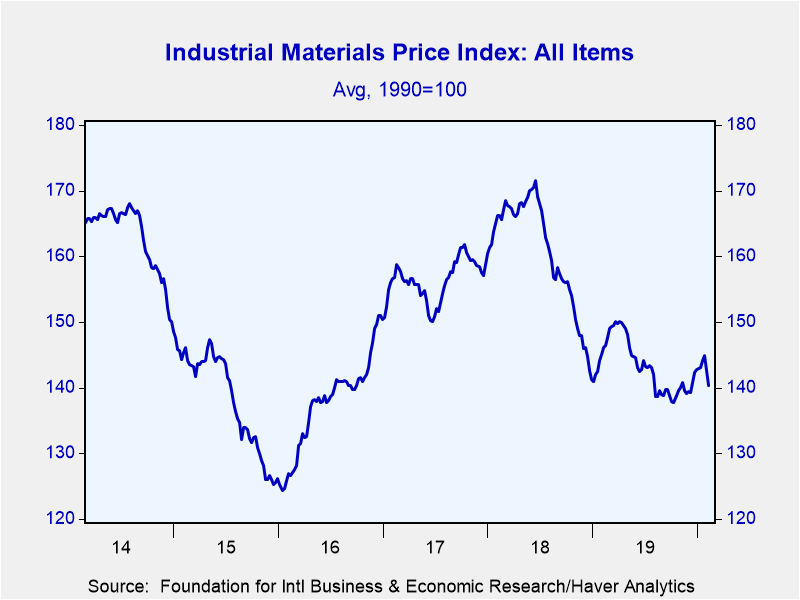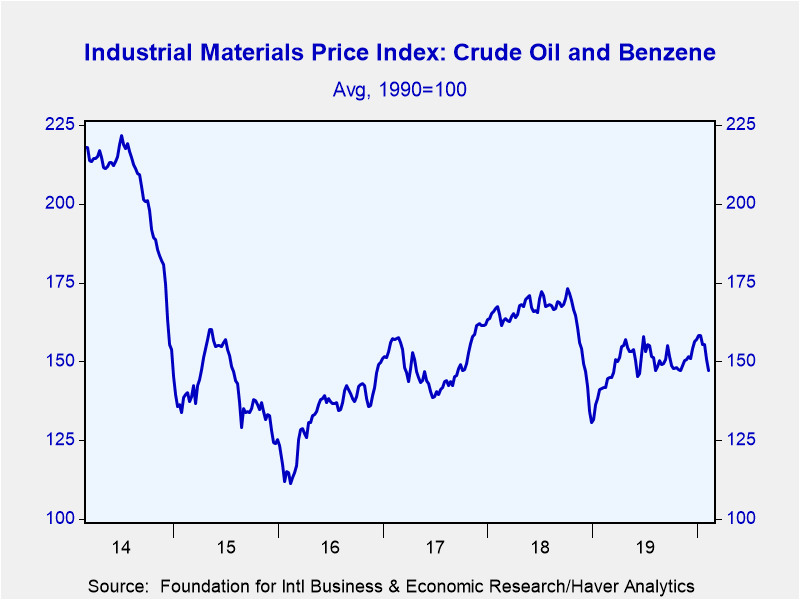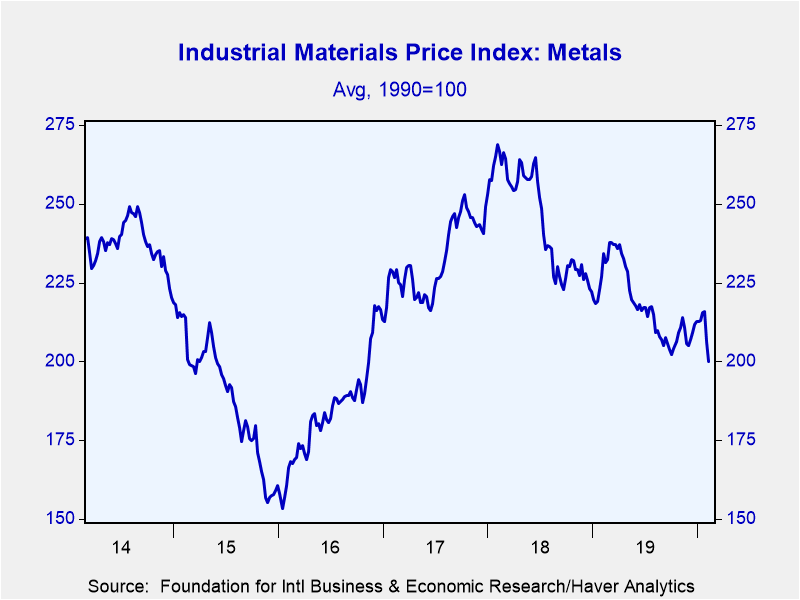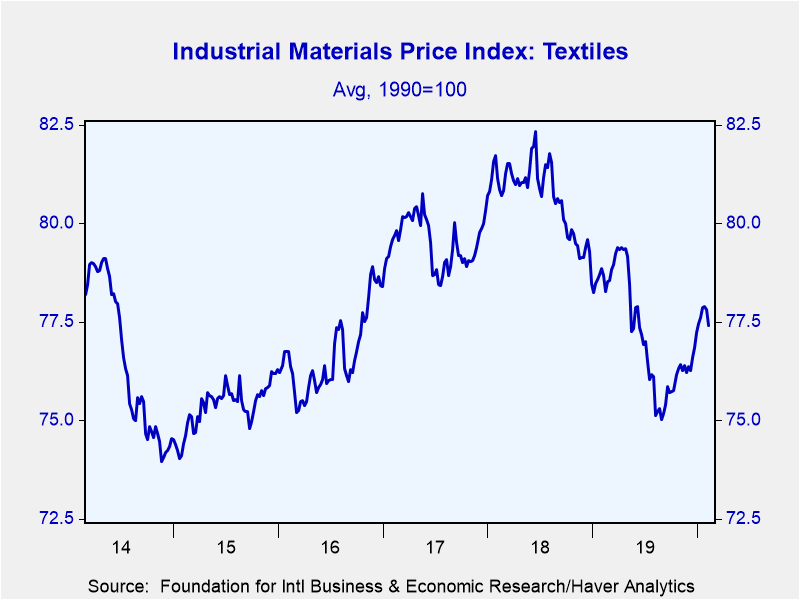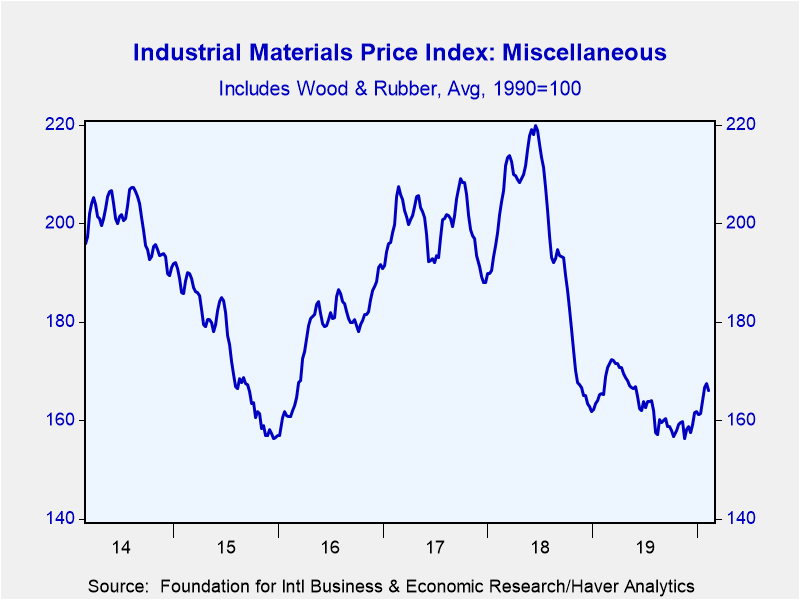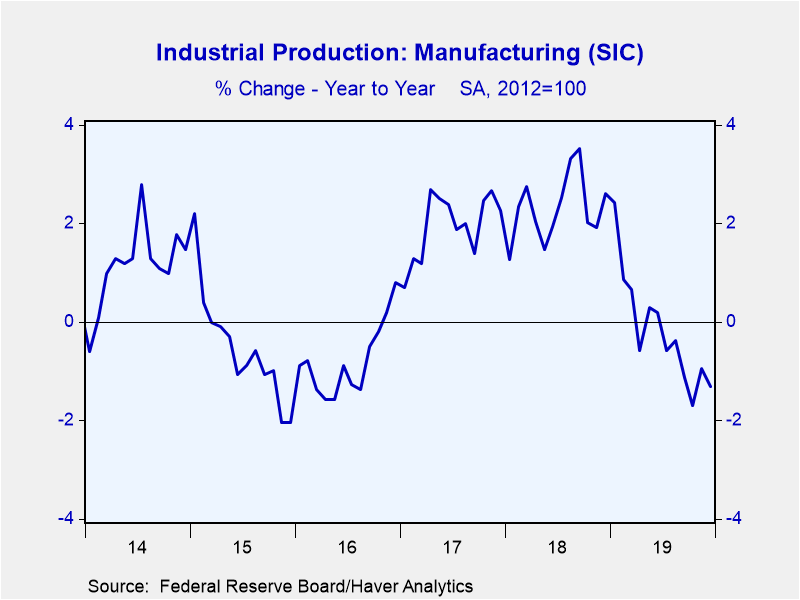 Global| Feb 10 2020
Global| Feb 10 2020FIBER: Industrial Commodity Prices Reverse Earlier Improvement
by:Tom Moeller
|in:Economy in Brief
Summary
The Industrial Materials Price Index from the Foundation for International Business and Economic Research (FIBER) declined 2.0% during the four weeks ended Friday and 4.0% over the last year. The price index had been increasing as [...]
The Industrial Materials Price Index from the Foundation for International Business and Economic Research (FIBER) declined 2.0% during the four weeks ended Friday and 4.0% over the last year. The price index had been increasing as recently as the prior week. Last week's decline wiped away all of the gains logged since early-December.
Prices in the crude oil & benzene group declined 7.1% during the last four weeks as WTI crude oil prices weakened to $51.23 per barrel on Friday from a high of $61.92 four weeks earlier. Prices of the petro-chemical benzene also fell 1.3% in the last four weeks (+33.2% y/y) and reversed increases since late last year. Excluding crude oil, industrial commodity prices declined 1.0% during the last four weeks. Metals prices were off 6.2% over four weeks as steel scrap prices weakened 12.1% to the lowest level since late-November. The price of copper scrap also fell 7.7% in four weeks to a four-month low. Zinc prices were off 6.1% over four weeks (-19.4% y/y) and the cost of aluminum fell 4.6% m/m to the lowest level since late in 2016. Lead prices eased 2.2% m/m (-10.8% y/y). Prices in the textile group eased 0.3% during the last month. Cotton prices declined 3.8% to the lowest level since late-December and burlap prices improved 3.4% in four weeks (-2.3% y/y) to a seven month high. Working the other way, prices in the miscellaneous group improved 3.0% over four weeks as the cost of framing lumber gained 6.3%, but plywood prices held steady over that period (-11.9% y/y). Natural rubber prices declined 6.6% during the last month.
The recent weakness in industrial commodity prices may reflect uncertainty weakness in demand from China. In the U.S., factory output improved 0.2% during December but remained down 1.3% y/y. During the last ten years, there has been a 65% correlation between the y/y change in industrial commodity prices and the y/y change in factory sector production.
Commodity price data can be found in Haver's DAILY, WEEKLY, USECON and CMDTY databases. The NABE forecast is in the SURVEYS database.
| FIBER Industrial Materials Price Index (%) | 1-Mth | 3-Mth | 6-Mth | 12-Mth | 2019 | 2018 | 2017 |
|---|---|---|---|---|---|---|---|
| All Items | -2.0 | -0.4 | 1.2 | -4.0 | 1.1 | -12.0 | 6.7 |
| Excluding Crude Oil | -1.0 | 0.2 | 1.6 | -3.9 | -0.6 | -11.1 | 4.9 |
| Textiles | -0.3 | 1.5 | 3.0 | -1.6 | -1.6 | -2.8 | 3.0 |
| Cotton (cents per pound) | -3.8 | 3.1 | 17.8 | -8.3 | -6.6 | -9.2 | 9.8 |
| Metals | -6.2 | -6.5 | -4.5 | -14.7 | -4.3 | -12.2 | 18.6 |
| Aluminum ($ per metric ton) | -4.6 | -5.8 | -2.5 | -9.4 | -6.5 | -12.7 | 26.0 |
| Copper Scrap (cents per pound) | -7.7 | -3.8 | -0.8 | -8.2 | 3.5 | -16.1 | 29.3 |
| Steel Scrap ($ per ton) | -12.1 | -0.7 | -9.3 | -20.3 | -0.8 | 2.3 | 16.8 |
| Crude Oil & Benzene | -7.1 | -1.0 | -0.1 | 3.7 | 20.2 | -20.0 | 8.1 |
| Crude Oil (WTI, $ per Barrel) | -17.2 | -9.5 | -5.1 | -5.1 | 35.5 | -24.4 | 10.9 |
| Miscellaneous | 3.0 | 4.0 | 5.4 | 0.6 | -0.0 | -14.8 | -0.5 |
| Framing Lumber ($ per 1000 board ft.) | 6.3 | 6.9 | 21.4 | 25.0 | 22.6 | -23.1 | 20.0 |
| Natural Rubber (cents per pound) | -6.6 | 2.3 | 3.1 | -4.8 | 10.7 | -4.1 | -29.6 |
Tom Moeller
AuthorMore in Author Profile »Prior to joining Haver Analytics in 2000, Mr. Moeller worked as the Economist at Chancellor Capital Management from 1985 to 1999. There, he developed comprehensive economic forecasts and interpreted economic data for equity and fixed income portfolio managers. Also at Chancellor, Mr. Moeller worked as an equity analyst and was responsible for researching and rating companies in the economically sensitive automobile and housing industries for investment in Chancellor’s equity portfolio. Prior to joining Chancellor, Mr. Moeller was an Economist at Citibank from 1979 to 1984. He also analyzed pricing behavior in the metals industry for the Council on Wage and Price Stability in Washington, D.C. In 1999, Mr. Moeller received the award for most accurate forecast from the Forecasters' Club of New York. From 1990 to 1992 he was President of the New York Association for Business Economists. Mr. Moeller earned an M.B.A. in Finance from Fordham University, where he graduated in 1987. He holds a Bachelor of Arts in Economics from George Washington University.


